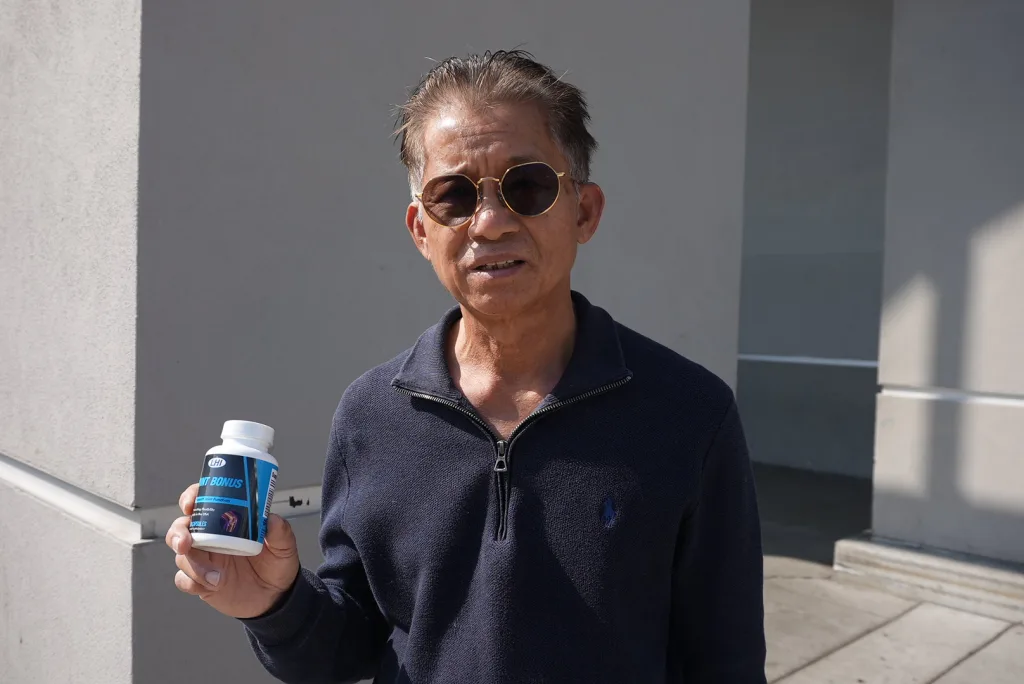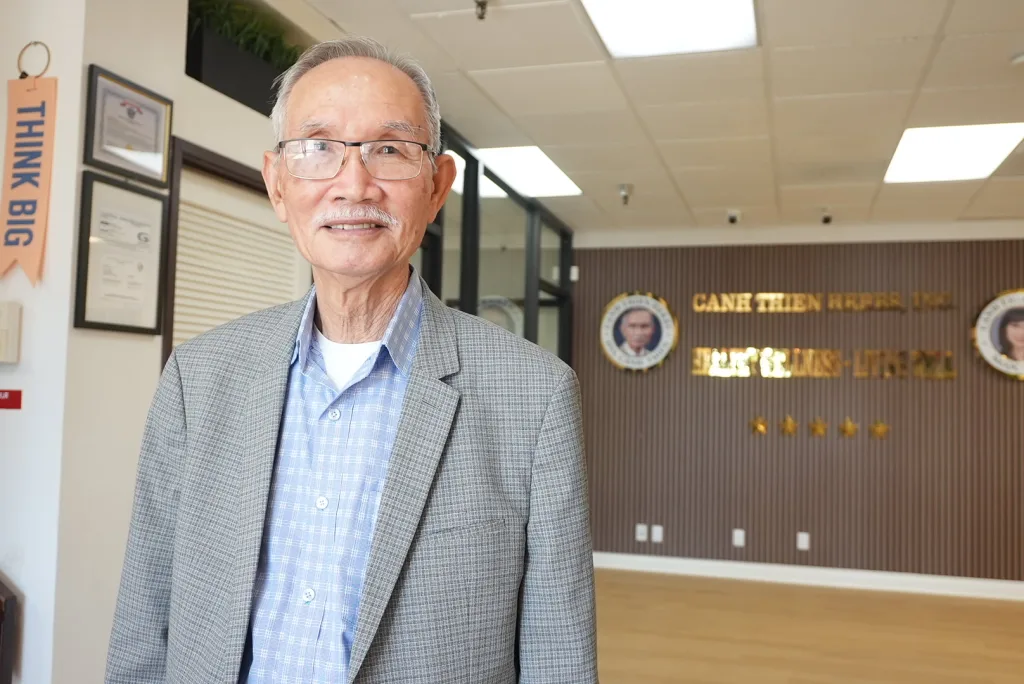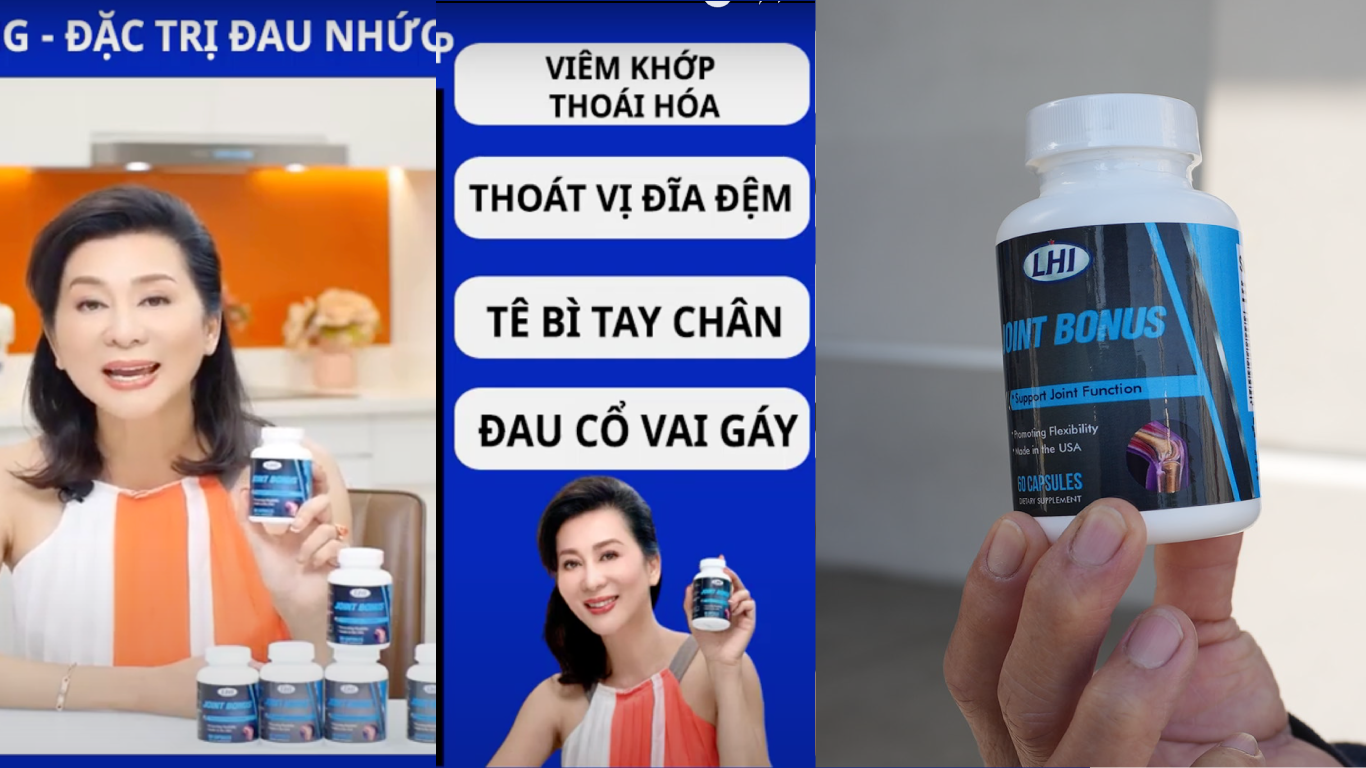“Everywhere I go, I am asked the same question: ‘how do you stay so fit?’,” says Nguyễn Cao Kỳ Duyên, a renowned Vietnamese American singer and emcee, in a YouTube ad. “‘You stand on high heels for hours and go to the gym, how do you do it?’ people will ask me.”
The video ad shows Nguyễn sitting in a brightly lit kitchen that could easily resemble the set of a home shopping channel. Her image is surrounded by graphics claiming that she has a special offer for those who call.
“Today, I will let you in on a secret,” she says in Vietnamese. “This is the pill I take every day that keeps my bones and joints healthy. It’s called Joint Bonus.”
It was this ad that caught the attention of Johnny Dang, a 70-year-old retiree from Carlsbad, California. He was watching a Vietnamese news broadcast on YouTube on his phone that Saturday afternoon when the ad came on.
“[Nguyễn is] well-known among the Vietnamese [community],” he said. Nguyễn might not be a celebrity to the broader U.S. population but countless Vietnamese households in the U.S. will recognize the singer and host of Paris By Night, a straight-to-tape variety show that some have dubbed the “bedrock of global Vietnamese culture.” Dang has been watching the show that Duyên emcees since its inception in 1983 when he was a young refugee trying to start a new life in California.
The now 70-year-old remembers thinking that if Nguyễn sold supplements, then they must be legitimate. And having had chronic joint pain, he figured these supplements could be a remedy to his aching bones. He took a screenshot and soon, after seeing another commercial for it later, ordered his first bottles, spending $500 on supplements.

Dang is one of seven Vietnamese people who have told Documented that they spent and lost, hundreds if not thousands, of dollars on two main supplements, Joint Bonus and Sugar Care, that use videos of Nguyễn as advertisements. All reported that the supplements did not work. Several online reviews of the supplement Joint Bonus on Amazon also warn that the product gives customers rashes, and is a “scam.”
Also Read: Misinformation on TikTok: How Documented Examined Hundreds of Videos in Different Languages
Not all products and supplements targeting Vietnamese immigrants online are scams. But more and more online scams are targeting people over 60 on the Internet, and for immigrants like Dang, who receive the majority of their news and entertainment on social platforms like YouTube and Facebook, online campaigns that sell questionable products become even more effective.
Experts tell Documented that these kinds of scams are particularly powerful because they address real health needs in marginalized communities in their own language. They also explained that these accounts often fly under the radar because they are in languages that aren’t part of the central focus of big tech companies — even if the YouTube ads the sellers use violate YouTube’s own policies which forbid posting health misinformation and violate federal FTC regulations by promising false health benefits. Sugar Care videos, for instance, state that customers may not need insulin shots once they have regularly used the supplements.
When Documented reached out to YouTube with examples of the ads, the company terminated the channels we had forwarded for their review.
“All the channels you provided have been terminated for violations of our policies prohibiting spam. YouTube doesn’t allow spam, scams, or other deceptive practices that take advantage of the YouTube community. We also don’t allow content where the main purpose is to trick others into leaving YouTube for another site,” wrote Jack Malon, a spokesperson for Google, the company that owns YouTube.
Meta, the company that owns Facebook, and Amazon, did not respond to a request for comment.
Documented purchased Joint Bonus and Sugar Care, the main two supplements that were advertised using Nguyễn’s videos on Amazon, and sent them to two labs to conduct scientific tests to understand what was in the supplements. One lab, Flora Labs, looked for traces of prescription drugs in Joint Bonus and Sugar Care, which it did not find. Scientists at IEH Laboratories & Consulting Group found that Joint Bonus contained low levels of lead. According to the lab, a recommended serving of Joint Bonus would contain roughly 0.21 µg/serving, which is less than half of 0.5 µg per serving that would require a warning label for toxins under California’s Prop 65 law. But while the prescribed dosage of the supplements — three tablets a day — would not require a warning label for the supplements, several customers told Documented that sellers would call them and push them to take more capsules, around six per day, which would come much closer to levels that would require a warning label, according to IEH Laboratories & Consulting Group.
A herbal medical practitioner in California said that dozens of people called him and told him of side effects, including rashes and joint swelling.
Our reporting also shows how online sellers are not only using footage of Nguyễn to sell their products but have also built sophisticated online tools to lure elders into their orbit. This includes targeted ads on YouTube, making fake Facebook groups and impersonating trusted figures in the Vietnamese community on fake websites that disappear as quickly as they are created. The advertisements that Documented analyzed were associated with 16 different telephone numbers with area codes from California, Colorado, Texas and Virginia. One number had an area code from Quebec.
The buyers who spoke to Documented said that once they called the advertised phone number, they were often harangued by people who spoke Vietnamese and who identified as doctors, pushing them to take more and more supplement capsules per day and to buy more bottles. None of the interviewees reported improved symptoms and all of them ended up spending between $500 and $2,000 dollars.
Over the past six months, Documented and Viet Fact Check investigated Joint Bonus and Sugar Care, two supplements that Nguyễn and other Vietnamese popstars have underwritten with their likeness. We uncovered 52 YouTube accounts that publish various edited versions of these video ads, more than half a dozen websites featuring fictitious medical doctors or false identities used to legitimize the products, Facebook ads targeting the Vietnamese in the U.S., and Amazon shops, many of which have been taken down in the process of this reporting. The ads themselves also make claims that can have dangerous effects: in one ad for Sugar Care, Nguyễn claims that users might be able to stop using their insulin shots if they take the supplements on a daily basis.
Documented emailed, texted and called Nguyễn for comment and did not receive a response by the time of publication. There is no evidence that Nguyễn was involved with the elaborate schemes built around Joint Bonus and Sugar Care but she has endorsed many other supplements on her website.
Documented also called 16 numbers affiliated with Joint Bonus and Sugar Care. Six numbers were no longer in service, nine did not respond to a request for comment, and one person texted back, saying they did sell the product and asked if we wanted to buy it though they did not answer any questions related to this story.
Immigrants have long been vulnerable to health-related scams and pyramid schemes, Pieter Cohen, a doctor at the Cambridge Health Alliance and an associate professor at Harvard Medical School said. Those who have limited knowledge of English are particularly vulnerable to health misinformation, making it easy for unreliable sources and predatory scammers to fill those information gaps.
But new online tools allow for much more specific targeting, Cohen said. Across social media platforms, health misinformation is thriving. For instance, misinformation around COVID-19 on YouTube outperformed quality information from government institutions, according to researchers at the University of Ottawa. Many immigrants receive vital information in their language on YouTube, TikTok and other social media, including health-related advice.
Immigrant communities are targeted “because [they] have limited or no access whatsoever to healthcare in the United States,” said Cohen. Immigrants also say they have been treated differently due to their race and accents and that they have often experienced difficulties in accessing culturally appropriate healthcare in their language, according to a report from KFF.
“What you’re describing is kind of a move from that to targeted marketing into the cyberspace and world of disinformation,” said Cohen.
Multiple Vietnamese elders told Documented that they would see the ads for Joint Bonus and Sugar Care on YouTube and Facebook. “They are all over,” said Dang.
Nguyễn Dinh and Nguyễn Khue are a married couple who share a YouTube account. They provided their account’s viewing history to their daughter Saoli Nguyễn, managing editor of Viet Fact Check, in New York. Their viewing history shows that the couple were targeted and watched at least 23 YouTube ads for both Sugar Care and Joint Bonus between October 6, 2023 and April 14, 2024, according to a Documented analysis. Twenty of those ads have been deleted since. The three remaining had 24,415, 29,648 and 147,229 views respectively.
Documented also identified more than 50 accounts with channel names like “jointbonususa2024” or “JointBonusUSA,” reposting videos featuring Nguyễn and other celebrities advertising the product but often listing different telephone numbers for viewers to call to buy the supplements. We also found various video ads for Joint Bonus and Sugar Care that have since been deleted. Documented found one having as many as 2 million views and another with more than 160,000 views.
Sugar Care and Joint Bonus are also listed on at least eight Amazon pages, costing as much as $89 per bottle. By comparison, most ginseng supplements on Amazon are priced between $15 to $24 a bottle.
With the help of Viet Fact Check, Documented found eight custom websites advertising Joint Bonus and Sugar Care, many of which have been taken down since Documented first accessed them. The sites make false claims about the product and its affiliations. One such website, for instance, that was hosted on the url jointhealthtips.com, claimed to be working with a doctor named Ralph Malone who supposedly works as an associate professor at the University of California San Francisco. A spokesperson at the university told Documented that UCSF has no connection to the product and that they have no record of a doctor named Ralph Malone working at the university.
Another site, registered at jointbonus.net, uses stock imagery of a doctor, but a reverse image search on the photo found that it was one of the first pictures that came up when searching for “Asian male medical doctor.” It also lists an address that is connected to the Texas Health Presbyterian Hospital in Dallas, but officials at the hospital say they are not connected to the product, nor have they ever heard about it.
Also Read: Second-Generation Americans: What to Do When Loved Ones Are Sharing Misinformation
One of the people that online sellers impersonated was Cảnh Thiên, a provider of oriental medical care in Garden Grove, California. Thiên owns two shops where he sells herbal supplements in the greater Los Angeles area in Garden Grove, California, and has been a licensed Doctor of Oriental Medicine in the Southern California area since the 1990s, he said.

Thiên told Documented that he began receiving calls from customers in the summer of 2023, complaining that they had bad side effects from a product called Joint Bonus that they said they bought from his website. But Thiên had never heard about the product before.
Sellers of the product had registered at least two domains using his name, Canhthieninc.online and canhthienherbs.com, to sell Joint Bonus, targeting Vietnamese folks in the U.S. with Facebook ads using Thiên’s image, and falsely claimed they worked with him when they spoke to customers on phone calls. Thiên said he’s received hundreds of calls from Vietnamese people either asking about Joint Bonus or Sugar Care or complaining about side effects, which include the swelling of joints, he said.
When Thiên learned about the Joint Bonus scheme he became extremely angry. He’s the third generation of his family to be an herbal medicine provider and was furious that people would use his reputation among the Vietnamese community in California to sell older immigrants a product that was making his patients sick.
Since learning about the impersonators, Thiên has filed for trademark for his brand, has been diligently collecting screenshots of fake ads that use his image and brand and has written up a long blog post about the supplement sellers. He has even called and recorded one seller who had pretended to be working with Thiên. When Thiên asked to speak to “Dr. Cảnh Thiên” the seller made up an excuse. In the audio, Thiên can then be heard telling the seller that he is the real Dr. Cảnh Thiên and that the seller should be ashamed of stealing Thiên’s identity.
YouTube announced a new initiative last year to combat medical misinformation on their platform but it is unclear how effective they have been in clamping down on campaigns that target immigrants in different languages. In many ways, it’s still up to consumers like Dang to find a way to smarten up about online scams and to protect themselves.
“There are just a lot of scams out there and it’s hard to know what’s real,” said Dang. “I no longer buy things online.” He said that he feels cheated. From now on he’ll only buy supplements from actual stores.
Viet Fact Check’s Paul Nguyen, Bella Khuu and Saoli Nguyen contributed reporting to this story.















